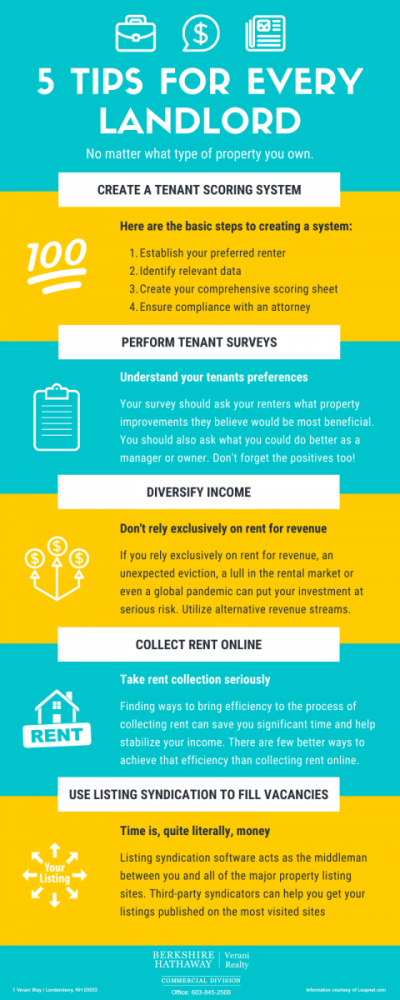Real estate professionals are always sharing tips and tricks for running a successful real estate business. A Google search of “tips for landlords” delivers over 20 million results; that’s a lot of advice to sift through. However, not every suggestion is applicable to every landlord or property, as no real estate business is the same as the next.
But there are some process improvements that every landlord should implement. It doesn’t matter if you manage commercial properties or student housing; whether it’s a local family business or a portfolio of assets spread throughout the United States.
Blog content provided to Loopnet.com by:
Dave Spooner, Co-founder, Innago
Create a Tenant Scoring System
Great articles will instruct you how to interpret criminal, eviction and credit reports and may even offer advice on other factors to look out for, like income levels and references. But few articles provide you with a methodology to make that process actionable, replicable and tailored to your business.
A tenant scoring system will do just that and, as a result, will improve your business. Tenant scoring systems ensure that you’re choosing the most qualified tenant based on objective factors. When you use a scoring system, you can also be sure that any implicit biases you might hold are not playing a role in your decision-making process.
Creating a tenant scoring system is relatively simple. Here are the basic steps:
- Establish your preferred renter: determine the types of renters you’re looking to (and can reasonably) attract. Which qualities are most important to you? This will guide your entire scoring system.
- Identify relevant data: now that you’ve defined your preferred renter, it’s time to think through what information will help you most easily identify them. Some key information will be collected with fields already included in your application, but you may also identify areas where your screening procedure fails to amass the information you need to make an informed decision about applicants.
- Create your scoring sheet: you should be as comprehensive as possible. Over time, you’ll further refine this scoring sheet to better represent the best possible renter for your property.
- Ensure compliance: for multifamily landlords, have an attorney review your scoring system to ensure it’s fair housing-compliant.
You should codify this system in a document that you can refer back to and modify over time. This will help you to further refine your criteria and will also offer you protection in case of any fair housing dispute.
Perform Tenant Surveys
In many ways, the relationship between landlords and their tenants is no different than between businesses and customers. Understanding your tenants’ preferences enables you to target your expenditures of time and energy in the most impactful manner.
Your survey should ask your renters (anonymously of course) what property improvements they believe would be most beneficial. You should also ask what you could do better as a manager or owner. Don’t forget to inquire about what they’re most pleased with about the property and your approach, as it’s just as important to understand your existing strengths.
Diversify Income
A fundamental tenet of financial investing is the importance of diversification. If you’re overleveraged in a particular asset type, you’re susceptible to financial shock.
If you rely exclusively on rent for revenue, an unexpected eviction, a lull in the rental market or even a global pandemic can put your investment at serious risk. Regardless of what’s in your portfolio, here are a few alternative revenue streams you can tap into as a landlord:
- Offer cleaning services.
- Rent out storage space.
- Monetize excess land.
- Lease out a billboard.
- Lease roof space to a cellular provider.
- Add coin-operated laundry.
Collect Rent Online
No matter how many revenue streams you add to your rental property, rent collection will almost certainly remain the most important facet of your business. Surprisingly, many landlords don’t take this process as seriously as they should. This often results in phone calls chasing down rent, unenforceable late fees and multiple trips back and forth to the bank.
From online bill-pay through your bank to property management software, there are many options to collect rent online. Potential features include automated payment reminders for tenants, easy methods to set up autopay, solutions to help enforce late fees and a wide variety of acceptable payment methods.
Finding the right balance between features, price and convenience will depend on your specific business objectives, but the larger point applies to all landlords: collecting rent online will make your life easier and your business more efficient.
Use Listing Syndication to Fill Vacancies
When it comes to vacancies, time is quite literally money. The longer your unit sits unrented, the more potential income you lose.
According to a study jointly produced by Google and Apartments.com — which, like LoopNet, is owned by CoStar Group —72% of apartment renters begin their search for a new rental online. But where online? For both commercial and residential properties, there can be an overwhelming number of listing services currently active. Fortunately, there’s listing syndication software.
Listing syndication software acts as the middleman between you and all of the major property listing sites. Third-party syndicators can help you get your listings published on the most visited sites, including LoopNet, CoStar and Apartments.com, all over the web. Once you choose a syndication platform and pass publishing control over to them, they’re able to use their network to get your listing posted on the sites that drive the most traffic.
(Original and complete article can be found on Loopnet’s website at https://www.loopnet.com/learn/5-tips-for-every-landlord/1886114582/.)
You can download a copy of our 5 Tips Infographic here:

0 Comments